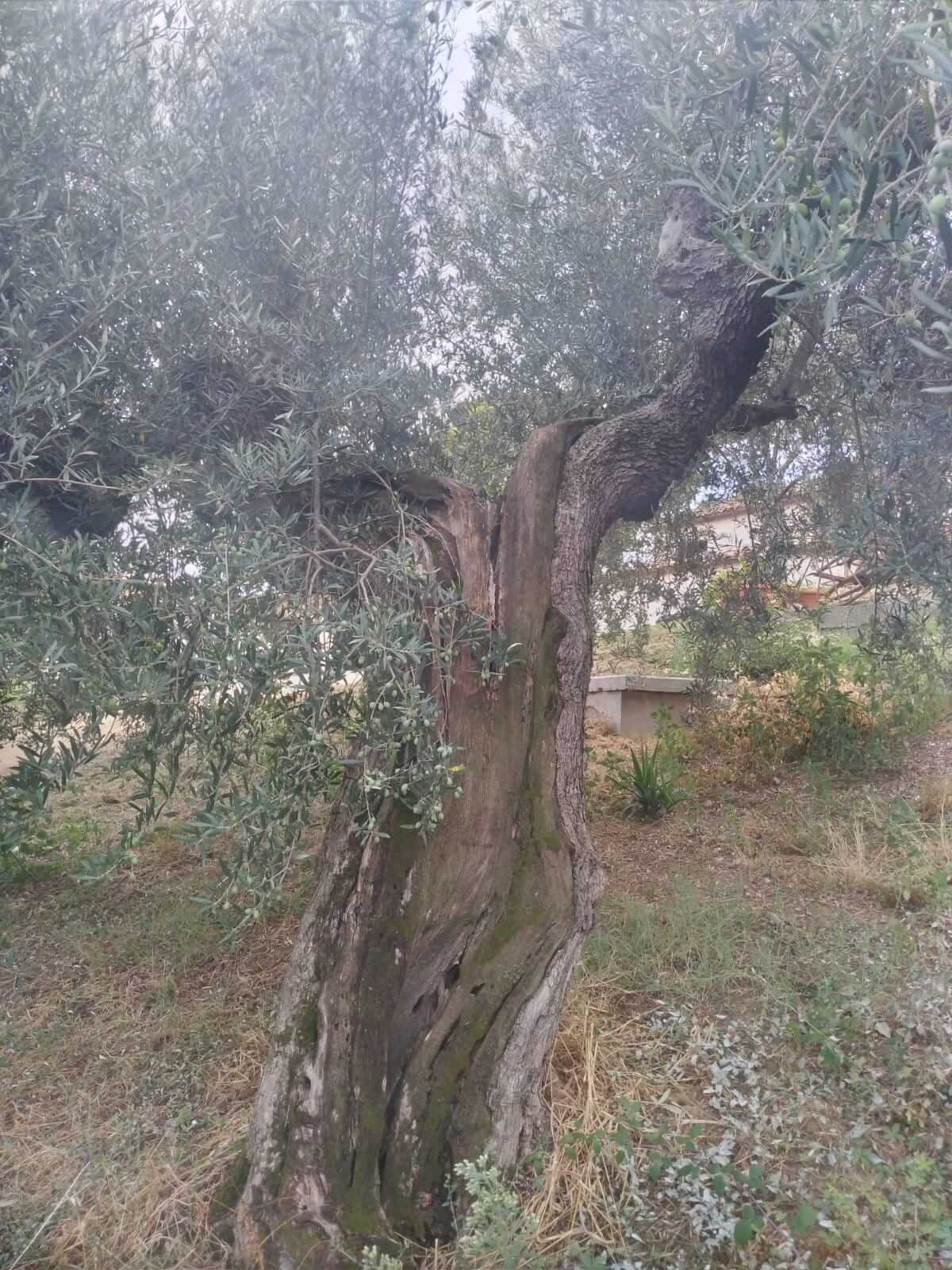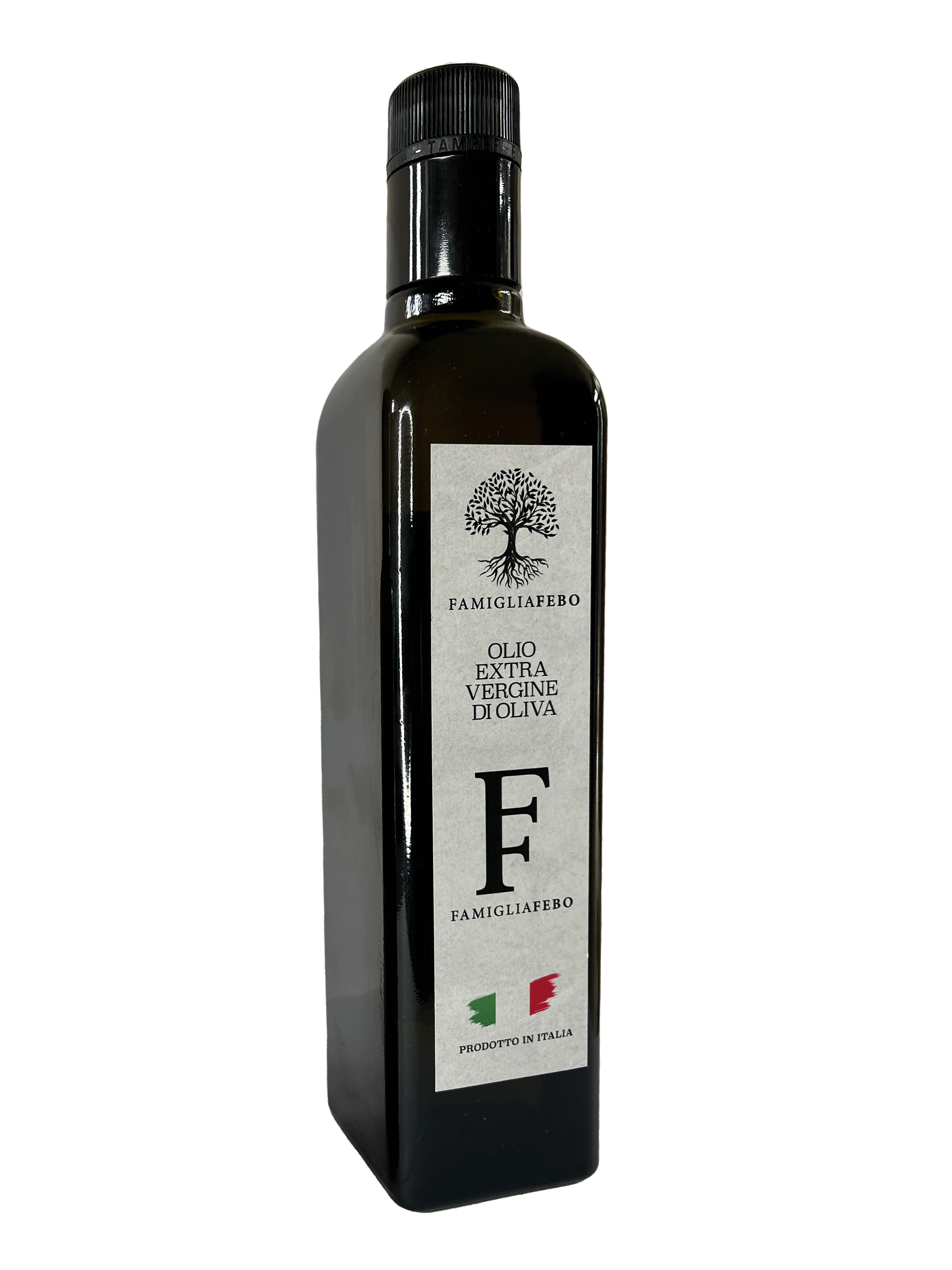If These Trees Could Talk...
The worlds of wine and olive oil are closely intertwined, as we’ve discussed in previous articles. EVOO can be tasted like wine, paired with food like wine, and one can search for descriptors in the bouquet and on the palate, just like wine. We’ve talked in previous articles about these similarities, as well as the health benefits of extra virgin olive oil, and how to cook with it. Because of these parallels, we often see winemakers cultivating olive groves alongside their vines, and making olive oil in addition to their wine.
Like in the case of the Febo family in Abruzzo, Italy. We know them initially for their organic, biodynamic natural wines: Trebbiano Abruzzese, Pecorino (the wine, not the cheese), and Montepulciano d’Abruzzo in both a rosé and red variations.
Then, after we started to import their wines, in came out of the woodwork that they also make their own organic extra virgin olive oil from their centuries old olive trees. Once we heard this, our ears perked… it’s olive oil that are allocated only to the family and a few local clients… hmmm, we asked “can we import some into the US?”. They answer we got was “yes”, and here we are with their family’s secret stash ready for the US market to enjoy.
While we learned all about Laura and Davide Febo’s winemaking roots of the family in our previous VeroTalk wine tasting chat with them, let’s find out about their family’s roots of extra virgin olive oil in this article.
An olive tree that is over 500 years old in the Febo family’s olive tree grove.
History of Olive Oil in the Febo Family
The Febo family’s olive tree groves were planted around the end of the 1600s or the beginning of the 1700s. They are not certain who planted this grove; Davide and Laura’s father, Paolo, has searched for answers in the state archives. Looking in birth and death records from Spoltore, where the Febo family farm is located in Abruzzo, Italy, they discovered that their ancestor, Alessandro Febo who was born in the first half of the 1500s, could be the answer. He lived on via Massera, where today Davide harvests their pecorino grapes to make Rolland Pecorino wine. In the land records, it shows also that this Febo ancestor, Alessandro, owned a few rows of vineyard and olive trees. They also have discovered that during the 1600s, in the area of Spoltore in Abruzzo, olive groves were planted en masse; in fact, before this, prior to the 1600s, the area was most likely used for grain.
Nonna Yolanda, Laura and Davide Febo’s grandmother, was the driving force behind her husband’s entrepreneurial spirit and ‘THE investor’, using her funds from selling fruits and vegetables locally to purchase the family’s cement tanks which allowed them to start a winery.
Returning to the Febo Family’s trees, the olive tree groves have been cultivated and cared for by the family for generations; they never stopped caring for them, since, as Abruzzese farmers, olives (and by consequence, olive oil) have been an important part of their livelihood. The diet of farmers was known as ‘cucina povera’ or, literally, poor cuisine. With large families and many mouths to feed, olive oil was an essential part of their diet as both a food and an ingredient. For this reason, olive groves were sacred for farmers. They were looked after carefully, e.g., given the proper care and nutrients, as the trees had to be in the best of health to produce the best possible fruit.
Davide and Laura’s grandfather, Rolando (for whom their Rolland pecorino wine is named), was born in Spoltore in 1927, and had looked after the olive grove his entire life, even into his old age (Grandfather Rolando passed away in 2016). He often talked about how the oldest and largest of the trees in the family grove were already that large in the 1930s when Rolando was just a child. Knowing that they were already at their full and majestic height over 90 years ago, it can be estimated that they were planted around the end of the 1600s, beginning of the 1700s.
Just like with their wine, as mentioned in our previous article about the Febo family, Nonno Rolando worked very hard at bringing about the olive oil part of the family business. In the mid 1950s, he was able to build a good market for the family’s extra virgin olive oil, working with local customers, but, as word spread, also getting requests from people outside their local area. With a hearty entrepreneurial spirit, Rolando took advantage of the economic post WWII boom to jump start the growth of the olive oil part of the business. Soon, the olive oil stopped being a food product for personal consumption, and started to become a bartering tool and genuine product to sell.
By Rolando’s side through this growth was his wife, Davide and Laura’s grandmother, Nonna Yolanda. She was a driving force behind this entrepreneur growth, and it was the profits from the sale of produce from her vegetable garden and fruit orchard that she sold at the local markets that purchased the Febo Family’s red and white cement tanks, allowing them to make their own wine, and therefore become a winemaking family, as we talked about in our last article about the Febos. She and Rolando worked their olive grove and made extra virgin olive oil together to sell to friends, local clients, and to keep for their private family consumption.
As a last example of the important part these ancient olive trees have played in the Febo family history, we see the tree in the photo to the left. Davide and Laura’s great-great-grandfather, Andrea Febo, was born in 1860 and passed away in 1909. Family legend says, Andrea, towards the end of his life, was plagued by health issues and pain in a time with very little medicinal relief. The family says he used to come sit under this ancient tree, already as tall and full grown over 100 years ago, that is now located nearby to the winery. When Andrea could not sleep, he would get out of bed and lay under the tree to find sleep and peace from his pains.
The ancient tree Great-Great-Grandfather Andrea Febo sat under to give him peace from his poor health and pains and sleep.
It is stories like this that give an extra special touch to the Febo family extra virgin olive oil; one can taste the passion, love, and history in every drop.
Farming & Harvesting Olives
The Febo Family’s extra virgin olive oil is produced and reserved in advance for special clients (like us!). It has more or less always been so, and Laura and Davide’s passion for the trees came from their Nonno Rolando’s passion and love for his plants. He was attentive, respectful, and protective of his plants, having spent years of his life safeguarding them. In the last years of his life, Rolando found it difficult to work in the vineyards and groves, yet he still maintained active interest in the olive groves. He would ask his family questions, even referring to individual trees, and remember precisely every nook and cranny of every tree trunk in the groves.
Today, the family continues to cultivate the trees with the same passion and they closely manage all of the production and conservation of the trees and oil.
Even with the trees there are certain aspects that must be diligently controlled to create the best product. Some examples of this quality control come about in every stage of the oil production. Such as picking and harvest at the right moment is necessary for a balanced flavor palate, and slowly with the changing weather patterns and climate is happening earlier and earlier every year.
Another important aspect of Febo’s agriculture is their commitment to organic farming practices, for both their wines and olives. They use the same philosophies in their olive oil cultivation as they do their winemaking: keep an eye on the plants, judging them based on their age, health, exposition, and soil. Then try to care for them with as minimal intervention as possible to keep the health of the plant at its best for every stage of production and the life cycle.
An important aspect of olive oil for Davide is to let it showcase the Abruzzese terroir as well as the varieties of olives in it. This is done by keeping the olives as well cared for and healthy as possible to give the most typical flavors of the different varieties. For example, the bitter or piquant flavors present in olive oil come from the polyphenols in the olives when harvested, which the intensity of is dependent on when the fruit is harvested.
With the hot and dry summers Abruzzo has experienced as of late, we asked Davide Febo how this is impacting their olive oil production. Thanks to olive trees loving hot and dry climates, fortunately these ‘climate change factors’ have not impacted the quality of olive oil. But harvesting is certainly much earlier. Davide’s father remember the harvests starting no sooner than end of October and continuing into December. In the past couple of years, harvesting has been happening a month earlier, starting as soon as mid September.
Finally, Making the Olive Oil
The crushing and pressing of the olives, which needs to happen as quickly as possible after harvest, must be done with good machines to ensure the processing goes smoothly without holdups. Defects in the oil can come about when the olives are not processed immediately after harvest. As well, it is important to manage and consider that the oil is placed in the correct container, bottle, or vessel that will ensure the olive oil will not be damaged by light or oxygen.
The Febos outsource the crushing and pressing to a frantoio, or oil mill, that has state-of-the-art equipment to maintain the highest quality. In fact, a fundamental aspect for preserving polyphenols, and thus the flavor intensity, is how exactly the milling and processing of the olives is performed, hence why Febo has picked one of the best milling plants in the area to help them process their olives.
Febo’s primary objective is to craft an extra virgin olive oil that not only is processed correctly, but also has authentic characteristics based on the vintage. To experience the terroir of Abruzzo in flavors of olive oil is the true art of crafting the olive oil, with smelling and tastinge typical flavors of cut grass, aromatic herbs, and almonds.
While certainly oil mill processing is a crucial step, the excellence of an organic extra virgin olive oil shines through thanks to the quality of the trees, fruit and to careful, diligent farming practices - that’s what makes the best EVOOs!
A bottle of Febo’s Organic Extra Virgin Olive Oil, ready to enjoy as a dressing or with cooking.
Blending Extra Virgin Olive Oil
The Febo family’s organic extra virgin olive oil is a blend of different varieties of olives. The main variety is known as the Leccino, as it is a variety that is hardy and very resilient in the face of difficult weather and climates. To the base of Leccino, other varieties such as the Dritta, the olivoce, the Iannara, and the frantoio are added for flavor and balance. However, all of these different varieties mature at different times, like grapes in the vineyard, so for this reason, experience has proven for the Febos that the best way to maintain quality is to offset the harvest of each tree or variety, making sure each plant is harvested and processed only at the perfect moment. This can lead, however, to oil that changes year to year in flavors change, like wine, based on the harvest, maturation, and climate. We, at Vero, love this, as it is the true mark of an artisan product produced with passion and care.
The Febo Family’s Favorite Ways to Use EVOO
For the Febos, extra virgin olive oil is an essential part of their diet and family cooking. For Davide, some of his most memorable dishes were the simple ones, like dipping bread in the olive oil, or drizzling some over traditional Abruzzo dishes like palotte cacio e pepe, or scrippelle ‘mbusse, or timballo. He also remembers fondly simply dressing fresh vegetables in a classic pinzimonio during the summer months when the vegetable garden is in full production. In the winter time, EVOO for them is essential to give a boost of flavor to vegetables simply sauteed on the stove.
One of his favorite dishes was a simple cucina povera dish prepared by Nonna Yolanda in the evening to taste the new olive oil, just brough back from the pressing mill. Called rivotica, it is a dish fairly similar to the crepe-like scrippelle (but without the egg in the batter), Nonna would grease a large skillet with the fresh oil, letting the perfume of the fresh oil fill the house, then mixing salt, flour, and water, she would use this batter to create a thin layer on the bottom of the pan, like with a crepe. After letting it cook a moment, she would flip the scrippelle using a movement known as rivotica in the Abruzzese dialect, letting it now cook on the other side and giving the dish its name. This was a family ritual and tradition they always participate in, as their grandparents had always inaugurated the new oil with this dish.
Regarding pairing wines with olive oil, Davide says it depends a lot on what food is cooked or dressed with the olive oil as well as the intensity of the oil. He loves their light red (almost rosé) wine Cerasuolo d'Abruzzo is a good choice as it is very versatile and pairs well with many dishes.
Taste the Fruits of the Febo Family’s Labor
Vero is so happy that we have the opportunity to also have Febo family’s stash of their Organic Extra Virgin Olive Oil; we just got it in, fresh and delicious, waiting for you to try it. Their organic EVOO is available both in 250 or 500ml sized bottles. Once you try it, and you get ‘hooked’ then you’ll always need a bottle around the house! For that we have for you a Subscribe and Save Olive Oil Subscription where we automatically send your bottle of choice EVOO directly to your door every month.
Taste all the fruits of the labor of the Febo family including their natural wines as well. Taste all four of their wines in this Abruzzo Natural Wine Explorer Set, and with shipping included add on a bottle of their olive oil too.





